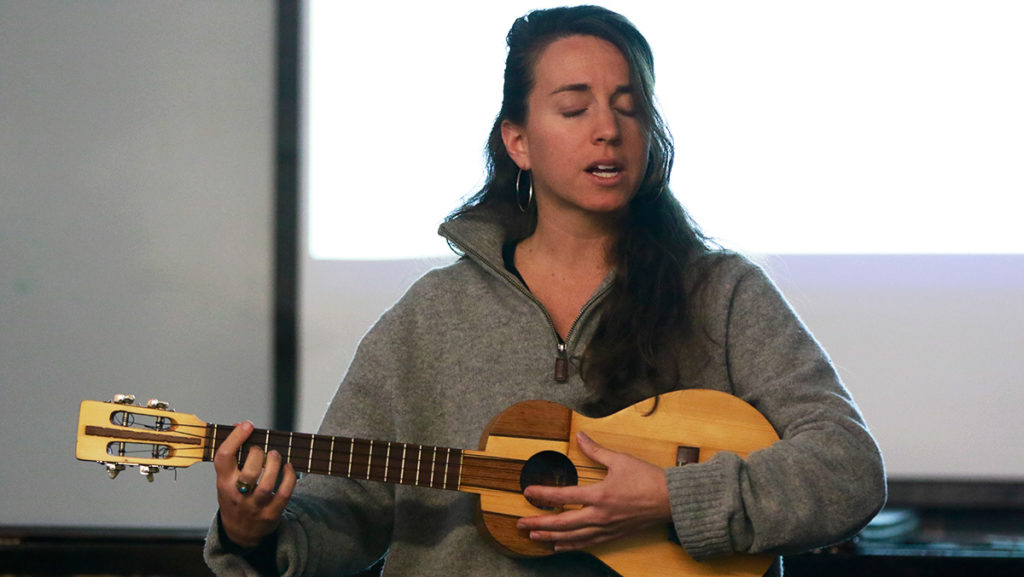“I hope you are inspired to go find someone who is an immigrant, in your neighborhood or on the border and become close to them,” said Natalia Serna, Columbian-American musician and sociologist, Feb. 26. “We need to stay close to the people around us.”
Her message, which she delivered through song at concerts downtown and on the Ithaca College campus, was one of awareness and understanding of the experience of immigrants in light of recent executive orders from President Donald Trump.
Serna performed part of her recent album, “Corazón Norte,” at a benefit concert Feb. 26 at the First Unitarian Society of Ithaca, as well as at a concert on campus, “Songs of the US-Mexico Border,” on Feb. 28 in the James J. Whalen Center for Music.
The concert downtown benefitted immigrants and refugees in the surrounding areas in Tompkins County. A donation of $10–20 was suggested at the front door of the church. Next to the donation basket were several sign-up sheets, asking citizens to volunteer their time by driving locals to court for immigration hearings. The concert at the college was free and open to the public.
Patricia Rodriguez, associate professor in the Department of Politics, Latin American studies coordinator and founding member of the Tompkins County Immigrant Rights Coalition — one of the organizations that organized the concert, said she wants students and members of the community to be aware of who is being affected by recent immigration orders and how.
Serna, also known by her stage name, La Muna, spent time in 2009 working at a soup kitchen on the border of Sonora, Mexico, and Nogales, Arizona. During this time, she said, she wrote songs about migrants trying to move across the border. She met many people ranging from young, innocent teenagers to pained and tired fathers.
In light of recent debates on immigration rights under the new Trump administration, Beth Harris, founding member of the coalition, said she felt it was appropriate to bring the coalition back after it fizzled away for a few years. Trump has announced he will construct a wall on the southern border of the U.S. and Mexico. Additionally, Trump put Executive Order 13769 into action Jan. 27, which placed severe limitations on traveling to the U.S. from certain countries. On Feb. 3, the order was put on a temporary restraining order through the court case State of Washington v. Trump et al.
“There was already a very severe problem of deportations and family detentions, as well as illegal treatment of immigrants, prior to Trump coming into office,” Harris said.
Problems that arose with The School of the Americas also inspired some locals to start up the coalition again. The school, Harris said, is a prison center for immigrants that has received backlash for human rights violations. It mainly trains government personnel who are affiliated with the Latin American region. The School of the Americas Watch was founded to try to stop the violations. A few years ago, the SOA moved its annual demonstration walk for awareness from Georgia to the border of Nogales, Mexico and Nogales, Arizona.
Serna, when she was working in Nogales, Mexico, she performed at the demonstration. This is where Harris and Serna met, and Harris said she decided that she needed to come to Tompkins County. Rodriguez worked with Harris to bring Serna to Ithaca.
“Her songs tell stories of migrants that she has accompanied, throughout the many people that she has met who have tried to come here,” Rodriguez said, introducing Serna on Feb. 26. “She has, for many years, lived on the border — and even traveled with migrants, so her songs are about migrants and about their stories.”
Serna performed three songs, each of which featured a short story about a specific individual whom she had met while at the border. Several of Serna’s songs were in Spanish, but she supplied translated lyrics on a screen behind the stage where possible.
She said she hopes her performances in Ithaca helped educate locals about the true lives of immigrants.
“In general, I feel like I am a bridge to the hearts of another person,” Serna said. “I hope that we can step away from the concept of migration as a big bad word and … get closer to the real people.”
Rodriguez said people need to understand the lives of immigrants in a deep manner to help propel them to freedom.
“I think that students need to be aware of the lives of people that are in fear,” Rodriguez said. “Their lives are being disrupted. We need to be aware — and not just in a surface kind of way.”














